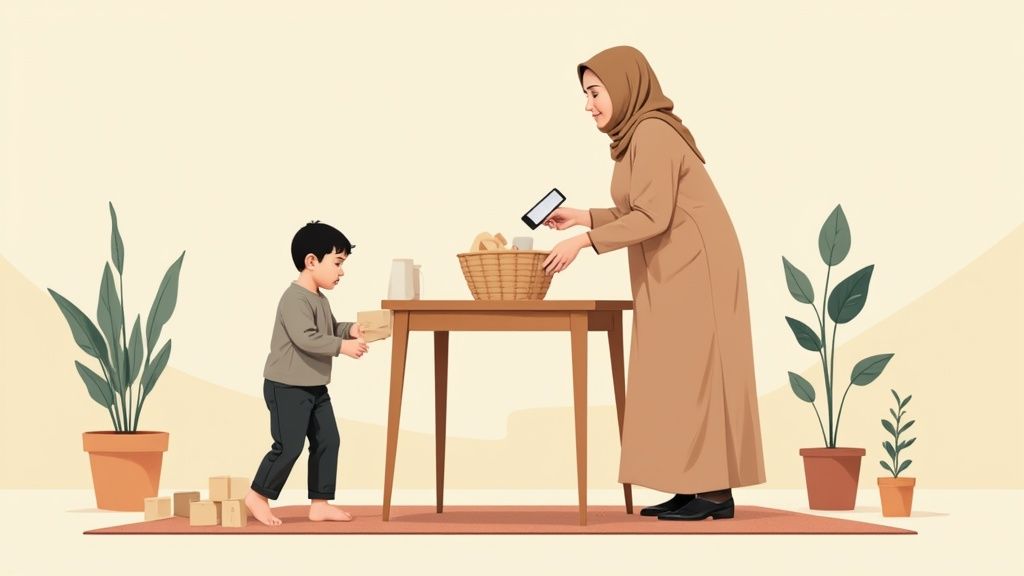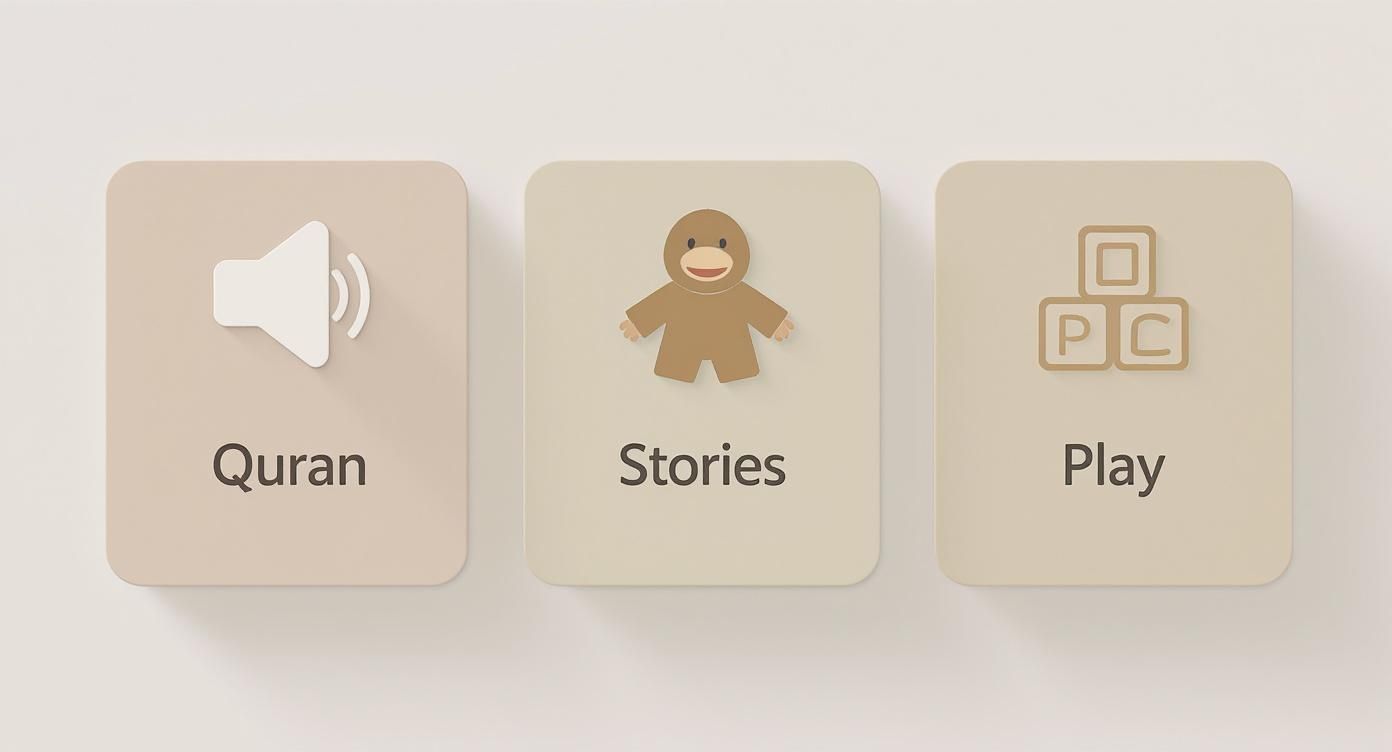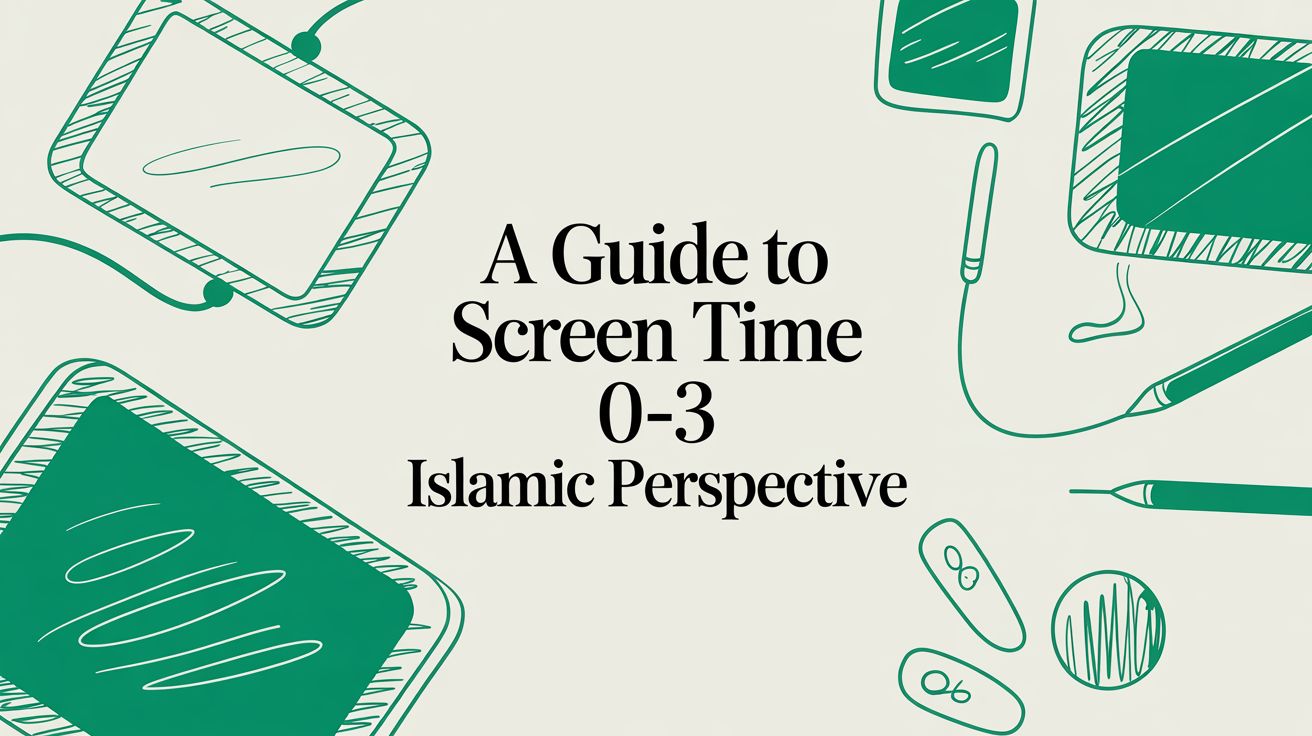From an Islamic viewpoint, the conversation around screen time for babies and toddlers isn't about a simple halal or haram ruling. It’s really about our role as guardians and the amanah (trust) Allah has given us. We're tasked with mindfully protecting our child’s innate goodness—their fitrah—in a world brimming with digital distractions.
An Islamic View on Screen Time for Young Children

As a Muslim parent, thinking about screens for your little one involves more than just pediatric guidelines. You're also weighing how these choices fit into your faith and the kind of person you hope to raise. It’s a completely modern challenge, one our beloved Prophet (peace be upon him) and his companions never encountered. And yet, the core principles of Islam offer us a clear and compassionate compass.
This isn't about making you feel guilty. It's about empowering you to make intentional choices that honor the precious trust Allah (SWT) has placed in your hands.
Nurturing a Child's Fitrah
Every child is born with fitrah—a natural, pure disposition and an innate belief in Allah. Your job as a parent is to protect and nurture this goodness. During the first three years of life, a child's brain develops at an astonishing pace, shaped almost entirely by real-world interaction, touch, and connection with you.
Excessive or inappropriate screen time can disrupt this crucial foundation. It often replaces the very interactions that build strong family bonds and teach Islamic manners through your loving example.
To help frame our thinking, we can lean on a few core Islamic concepts.
Here's a quick look at how these foundational Islamic principles guide our decisions on early screen time.
Islamic Principles Applied to Early Screen Time
| Islamic Principle | Meaning | Application to Screen Time (0-3) |
|---|---|---|
| Amanah (Trust) | A sacred trust or responsibility given by Allah. | Your child is a trust. Protecting their developing mind, eyes, and spirit from potential harm is part of fulfilling this trust. |
| Fitrah (Natural Disposition) | The pure, innate state a child is born in. | Nurture this purity with real-world experiences, human connection, and exposure to nature—not with passive, digital consumption. |
| Wasatiyyah (Moderation) | The principle of following a balanced, middle path. | Avoid extremes. This means not banning technology entirely out of fear, but also not allowing it to dominate family life and distract from our duties. |
| Tarbiyah (Upbringing) | The active, holistic process of nurturing a child's character, knowledge, and faith. | True tarbiyah happens through presence, conversation, and shared activities. Screens can become a barrier to this active process. |
By keeping these principles in mind, we move the conversation from "Is this okay?" to "How can I best fulfill my responsibility to Allah and my child?"
A Modern Challenge in Muslim Homes
Concerns about early screen exposure are growing everywhere, and Muslim communities are right in the middle of it. In Saudi Arabia, for example, the average toddler already spends about three hours per day on screens. This breaks down to two hours of television and one hour on mobile devices—a huge amount of time for a developing mind. You can read more about these screen time findings and what they mean for families.
This guide is here to help you navigate these challenges with confidence, inshaAllah. We’ll explore the developmental science behind screen time recommendations and connect it directly to the timeless wisdom of our deen. By understanding both, you can create a home environment that fosters connection, peace, and faith.
To explore this topic in greater detail, you can also check out our guide on Muslim parenting in the digital age.
How Screens Impact Your Child's Brain and Iman
To make the best choices for our little ones, it helps to understand what's actually happening inside their developing minds and hearts when they're in front of a screen. For babies and toddlers, the world is a sensory explosion. Their brains are building connections at an incredible speed with every single thing they see, hear, and touch. This period is foundational—it sets the stage for everything that comes later, from learning and behavior to their connection with Allah.
Think about what happens when a young child plays with a loving caregiver. Their brain absolutely lights up. They’re learning the natural give-and-take of conversation, figuring out what a smile or a frown means, and learning how to handle big feelings. This beautiful, messy, real-life interaction is like superfood for their brain, strengthening the pathways for language and emotional well-being.
Screens, however, tend to offer a one-way street of information. It's a passive experience that doesn't ask for the same kind of active participation. And the research is pretty clear: this can slow down the pace of language development and even chip away at their ability to focus.
The Connection Between Brain Science and Islamic Values
From a faith perspective, this is about more than just hitting developmental milestones. It’s about cultivating good character—our akhlaq. Virtues that are at the very heart of our deen, like patience (sabr), self-control, and empathy, aren't just things we teach with words. They’re grown through practice, especially in those precious early years.
A child’s brain is wired for human connection. When we replace real-world play and interaction with passive screen viewing, we may unintentionally hinder the development of patience and self-regulation—qualities essential for a strong iman.
Those super-fast cartoons and instant-win games can make it tough for a child to learn how to wait, push through something difficult, or just be still. When we're intentional about screen time, we're not just limiting something negative; we are actively creating a home environment where these beautiful Islamic virtues can take root and grow.
A Look at Screen Time in Muslim Communities
This is a challenge families are grappling with all over the world. A 2023 study, for example, found that young children in Iran were spending around 4.5 hours per day on screens. That’s a huge jump from the one-hour maximum that health experts recommend.
Within the context of a typical Muslim household—often filled with extended family and rich with home-based religious learning—this level of screen use can really get in the way of those priceless moments for family bonding and early Islamic education. You can read the full study about these findings to get a deeper sense of the issue.
The goal here isn't to scare anyone, but to give you the information you need to make confident choices. Setting limits on screens isn't about depriving your child. It's about proactively giving them the best possible start by nurturing their mind and soul in a way that truly aligns with our beautiful faith.
Practical Ways to Manage Screens in Your Home

Knowing the principles is one thing, but actually putting them into practice? That’s the real challenge, especially in the beautiful chaos of life with little ones. How do you possibly avoid screens when you're rushing to get iftar on the table before Maghrib, or just need a quiet moment for Salah?
The answer isn't a sudden, stressful ban on all devices. It's about making small, intentional shifts that honor your family's unique rhythm. The goal is to create a home where screens are a specific tool, not the automatic go-to. This journey starts with us, the parents, by adjusting our own habits to create more space for connection. Remember to be gentle with yourself—this is about gradual change, not overnight perfection.
Create Screen-Free Zones and Times
One of the most powerful ways to curb the screen habit is to designate specific areas in your home as completely screen-free. These zones become protected spaces for play, interaction, and worship, subtly reinforcing what your family values most.
- The Prayer Space: Keep the area around your prayer mats totally free of devices. This teaches your child from the very beginning that this is a sacred space for connecting with Allah (SWT), without any digital noise.
- The Dining Table: Make mealtimes a device-free zone for everyone. This simple rule encourages conversation, helps toddlers focus on their food, and turns eating into a moment of shared family barakah.
- The Bedroom: Keeping screens out of sleeping areas is crucial for helping little ones wind down. It protects their natural sleep cycles, which are absolutely essential for healthy development.
Just as important as screen-free places are screen-free times. Carving out predictable moments, like the hour after Fajr or the time leading up to Maghrib, can create cherished family rituals for quiet play, reading stories, or just being together.
Establish Predictable Routines
Toddlers don't just like routine; they thrive on it. Knowing what comes next gives them a deep sense of security and stability. When their day is structured with engaging, predictable activities, the need or desire for a screen often just melts away.
A solid daily rhythm doesn't have to be rigid or stressful, but it should have a gentle, familiar flow. In fact, building a healthy and predictable Muslim toddler routine is one of the most effective strategies for managing behavior and reducing screen dependency without constant battles.
The most powerful tool against screen dependency is a fulfilling routine. When a child's day is rich with connection, play, and predictable rhythms, the allure of a screen naturally fades into the background.
This isn't just a hunch; it's a challenge felt by families everywhere. A 2023 study in Malaysia found that a staggering 65.7% of preschoolers showed signs of screen dependency, largely because screens had become an unquestioned part of their daily schedule. By creating your own routines centered on connection and real-world play, you are proactively building a healthier foundation. You can find more details in this study on screen media dependency.
The Power of the Device Basket
Here’s a simple strategy that works wonders: create a "device basket." It’s exactly what it sounds like—a designated basket or box where all family members, parents included, place their phones during screen-free times.
It’s a classic case of "out of sight, out of mind." This small act does more than just remove the temptation. It models the exact behavior you want to see in your children and, most importantly, it makes you more present and available for them—which is, after all, the ultimate goal.
Faith-Centered Alternatives to Screen Time
So, you’ve decided to cut back on screens. That’s a huge first step. But it almost immediately leads to the next big question: "What am I supposed to do instead?" It’s a valid concern, especially when you're in the thick of it—trying to get dinner on the table with a toddler hanging on your leg.
The beautiful truth is that you don’t need a room full of expensive, educational toys or Pinterest-perfect activities to fill your child’s day with connection and faith. The most powerful alternatives are usually the simplest ones, rooted in just being present and using things you already have around the house.
This isn't just about keeping your child busy. It’s about intentionally building their brain, nurturing their spirit, and making your bond with them even stronger. This very idea is at the heart of Islamic parenting, which has always emphasized real-world experiences that protect a child's pure, innate nature—their fitrah.
Simple, Low-Prep Ideas for Everyday Moments
The key is to weave these enriching, screen-free moments into the natural flow of your day. Most of these ideas take just a minute or two to set up and can easily be tweaked for a baby who's just exploring or a more curious toddler.
Here are a few faith-centered ideas you can try today:
- Quran and Sensory Play: Grab a shallow tray or bin and fill it with something like rice, lentils, or even just a bit of water (with close supervision, of course!). Toss in a few scoops and cups. As your little one digs in and explores the different textures, play a soft Quran recitation in the background. It creates such a peaceful atmosphere and helps them associate the sound of the Quran with calm, happy play.
- Prophet Story Puppets: You really don't need to be fancy here. A quick drawing on a paper bag or even just using your own hands can bring a story to life. You could tell a simple version of the story of Musa (AS) parting the sea with your hand gestures, or Yunus (AS) in the belly of the whale. It's the interaction, not the props, that they'll remember.
- "Salah Practice" with a Doll: Little ones are master imitators. Lay out a small prayer mat next to yours and give your child a favorite doll or teddy bear to "pray" alongside them. This kind of playful imitation is a wonderful, no-pressure way to introduce them to the beauty of Salah.
The most enriching toy a child can have is a present and engaged parent. Simple, shared moments of play and discovery build a foundation for learning and faith far more effectively than any screen.
Building an Environment of Connection
When it comes right down to it, the best alternative to a screen is you. Your presence, your voice, and your touch are the most critical ingredients for your child’s healthy development. Try to see these activities less as a checklist to get through and more as invitations to connect.
When your child is building with blocks, get down on the floor with them for a few minutes and say, "SubhanAllah, what a tall tower!" When you're outside, point to a bright red flower and say, "Look at what Allah created for us."
These small, consistent interactions are what fill your child’s emotional cup and, over time, make the pull of a screen seem less and less exciting. You're teaching them that the real world—the one filled with family, faith, and Allah's beautiful creation—is the most interesting place to be.
Choosing Quality Content When Screens Are On
Let’s be realistic: there will be moments when you decide to use screens with your toddler. When that happens, a simple shift in mindset can change everything. Instead of viewing it as just a way to keep them busy, we can treat it as an intentional, purposeful activity. For children over two, the conversation isn't about if they get screen time, but rather what they watch and how they watch it.
The real goal is to turn what is often a solo, passive experience into something shared and active. This approach fits beautifully with the Islamic principle of tarbiyah, which is all about a child's holistic development. Every interaction becomes a chance to guide and nurture them.
What Makes Content "Halal" and Healthy?
When we filter media through our faith, it becomes easier to sift through the noise and find what’s truly good for our little ones. A "Halal Media" mindset really comes down to three key things: the Content itself, the Context in which it's viewed, and the importance of Co-viewing (watching together).
Look for content that is slow-paced and calm. A toddler's brain is still developing its ability to focus, and hyper-stimulating shows can be overwhelming. Simple, educational videos that gently introduce things like colors, shapes, or even the Arabic alphabet are far more beneficial.
The best kind of screen time is slow, simple, and shared. Think of it more like a calm, interactive storybook than a chaotic, fast-paced cartoon. This not only protects their innocence (fitrah) but also helps build good manners (adab).
It’s just as important to know what to avoid. Steer clear of videos with loud, distracting background music, particularly those with instruments. Also, be mindful of content that shows negative behaviors like yelling, hitting, or disrespect—toddlers are little sponges and will imitate everything they see.
This image offers a great visual reminder of what to prioritize instead of screens.

It perfectly illustrates how core faith-based activities—listening to the Quran, sharing stories, and simple play—are the true cornerstones of a healthy, spiritually-grounded upbringing.
A Quick Checklist for Parents
To make it even easier, here's a quick reference guide to help you evaluate apps, shows, and videos for your toddler.
Halal Media Checklist for Ages 2-3
| Check For | Avoid | Why It Matters Islamically |
|---|---|---|
| Slow, gentle pacing | Fast cuts, flashing lights, loud sound effects | Protects their developing brain and attention span; encourages a calm temperament. |
| Simple, clear educational concepts | Complex storylines or abstract ideas | Aligns with seeking beneficial knowledge (ilm naafi') in an age-appropriate way. |
| Positive role models and kind interactions | Rudeness, violence, or disrespectful behavior | Teaches good character (akhlaq) and manners (adab) through imitation. |
| Nasheeds (vocals only) or no music | Mainstream music, especially with instruments | Adheres to Islamic principles regarding music and avoids unnecessary distractions. |
| Teaches Islamic values (e.g., sharing, saying Bismillah) | Content that promotes materialism or un-Islamic themes | Instills a love for Allah and the Deen from the very beginning. |
This checklist isn't about being restrictive; it's about being intentional. By choosing media that aligns with our values, we ensure that even screen time can be a positive force in our child's life.
The Power of Watching Together
Even the highest-quality content can fall short if a child is just left to watch it alone. Co-viewing is probably the most critical piece of the puzzle. When you sit with your toddler, you transform the experience.
Talk about what’s happening on the screen. Ask simple questions like, "What color is that apple?" or "Look, the kitty is saying Bismillah!" This turns passive viewing into an active conversation, which is fantastic for building language skills and strengthening your bond.
While platforms like YouTube Kids can seem like a good starting point, their algorithms can still sometimes serve up content that isn't ideal. For a more curated and trustworthy library, it's worth seeking out dedicated resources. We explore this further in our guide to finding safe Islamic content on YouTube Kids.
By being selective about the what and present for the how, you can make sure that screen time, when it happens, truly serves your family's values and your child's well-being.
Answering Your Common Screen Time Questions
It's one thing to understand the research and the Islamic principles, but it's another thing entirely to apply them in the middle of a busy day with a little one. You've got questions, and that's completely normal. Let's walk through some of the most common concerns we hear from Muslim parents, one by one.
The goal here isn’t perfection. It's about finding confidence and clarity, knowing you're making intentional choices for your family, one small step at a time.
Is It Haram to Let My Baby Watch TV?
This question comes straight from the heart, and it weighs on so many of us. The simple answer is no—there isn't a direct verse or hadith that makes watching a screen inherently haram (forbidden). Islamic guidance is rarely about a simple yes or no; it's about the principles behind our actions.
Our faith teaches us that our children are a sacred trust, an amanah from Allah (SWT). Our job is to protect their well-being in every way—physically, mentally, and spiritually. So, instead of asking, "Is this forbidden?" a more powerful question is, "Is this the best possible thing for my child's developing mind and pure nature (fitrah) right now?" This simple shift moves us from a place of fear to one of mindful, loving care.
What About Using Quran Videos for My Toddler?
It’s a beautiful intention to want to connect your child with the Quran using technology. But for babies and toddlers under three, just watching a video isn't the most effective way for them to build a genuine love for Allah's words.
At this tender age, children learn through all their senses—touch, sound, sight, and interaction. You'll have a much bigger impact by simply playing a beautiful Quran recitation while they're busy with their toys. The sound becomes a familiar, comforting part of their environment. If you do decide to show a short, high-quality Quranic animation, make it a shared experience. Snuggle up, watch it together, point things out, and talk about the beautiful sounds and colors.
How Do I Handle Screens with Grandparents and Family?
This is such a common and delicate situation. Navigating different approaches to screen time with loved ones, especially grandparents, calls for a lot of wisdom and gentleness.
The key is to frame your choices around what’s best for your child, not as a criticism of anyone else's habits. You can explain your reasoning kindly and clearly without being confrontational.
Try saying something warm and positive, like: “We’re really trying to focus on hands-on play to help with their talking right now, so we’re limiting screens. Would you like to read this story with them instead? They would absolutely love that.”
This approach sets a firm but loving boundary, honors your family relationship, and gives them another beautiful way to connect with their grandchild.
I Feel Guilty When I Use Screens to Get Things Done. What Should I Do?
First, please be kind to yourself. Guilt is a heavy, unproductive weight for any parent. The reality is that raising young children is demanding, and needing a few minutes to cook dinner, pray your Salah, or just catch your breath is completely valid.
Instead of drowning in guilt, try shifting your focus to your niyyah (intention) and celebrating small wins. If you cut down screen time by just 15 minutes today compared to yesterday, that is a genuine success. Allah (SWT) sees your effort, your struggle, and your deep desire to do what's best. Approach this with self-compassion, not self-criticism.
Parenting in a way that feels true to your faith is a beautiful journey. For families looking for a truly safe, ad-free, and faith-aligned screen time solution, Babymode is being built with you in mind. Our platform offers a curated library of content reviewed for Islamic values and designed to nurture your child’s development. Join the Babymode waitlist for early access and be the first to know when we launch, inshaAllah.



